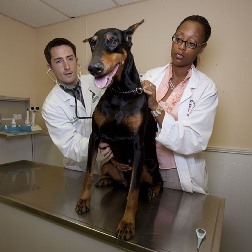How to Select a Vet Assistant Program near Plymouth Connecticut
 Realizing your long term goal of working with and helping pets by enrolling in a veterinary program near Plymouth CT could initially feel like an overwhelming task. After all, you need to search for and enroll in a school that will provide the appropriate training so that you can succeed as a vet technician, assistant or technologist. But just how do you approach assessing and comparing schools so that you can make the ideal selection? Many future students start their due diligence process by searching for colleges that are close to their residences. When they have identified some area schools, they find out which ones have the cheapest tuition and focus on those. Although location and expense are important considerations when comparing vet tech schools, they are not the only important ones when making your assessments. Factors such as internship programs and accreditation need to be evaluated also. The point is that there are questions you should be asking the veterinary tech programs you are looking at before you make an ultimate selection. We have furnished several within this article to help get you started, but before we discuss them we’ll talk about the varied responsibilities of veterinary techs and assistants and the training options offered.
Realizing your long term goal of working with and helping pets by enrolling in a veterinary program near Plymouth CT could initially feel like an overwhelming task. After all, you need to search for and enroll in a school that will provide the appropriate training so that you can succeed as a vet technician, assistant or technologist. But just how do you approach assessing and comparing schools so that you can make the ideal selection? Many future students start their due diligence process by searching for colleges that are close to their residences. When they have identified some area schools, they find out which ones have the cheapest tuition and focus on those. Although location and expense are important considerations when comparing vet tech schools, they are not the only important ones when making your assessments. Factors such as internship programs and accreditation need to be evaluated also. The point is that there are questions you should be asking the veterinary tech programs you are looking at before you make an ultimate selection. We have furnished several within this article to help get you started, but before we discuss them we’ll talk about the varied responsibilities of veterinary techs and assistants and the training options offered.
The Responsibilities of a Vet Assistant and Tech
 Among the initial decisions that you will have to make is if you desire to train as a vet assistant, technologist or technician. Part of your preference may be dependent on the amount of time and money that you have to commit to your training, but the main factor will probably be which specialization appeals to you the most. What vet techs and assistants share in common is that they both work under the immediate supervision of a licensed and practicing veterinarian. And even though there are numerous tasks that they can perform within the Plymouth CT veterinary practice or hospital, they can’t prescribe drugs, diagnose ailments, or carry out surgeries. In those areas they may only provide assistance to a licensed veterinarian. There are technologists and technicians that work away from the standard veterinarian practice, for example for animal shelters, zoos or police departments. Let’s take a look at the duties and education prerequisites for each position.
Among the initial decisions that you will have to make is if you desire to train as a vet assistant, technologist or technician. Part of your preference may be dependent on the amount of time and money that you have to commit to your training, but the main factor will probably be which specialization appeals to you the most. What vet techs and assistants share in common is that they both work under the immediate supervision of a licensed and practicing veterinarian. And even though there are numerous tasks that they can perform within the Plymouth CT veterinary practice or hospital, they can’t prescribe drugs, diagnose ailments, or carry out surgeries. In those areas they may only provide assistance to a licensed veterinarian. There are technologists and technicians that work away from the standard veterinarian practice, for example for animal shelters, zoos or police departments. Let’s take a look at the duties and education prerequisites for each position.
- Vet Assistants in most instances will have undergone a structured training program, either as an apprentice or intern in a practice, or by graduating from a certificate program at a vocational school or community college near Plymouth CT. As the name implies, their job function is to assist the veterinarians and vet technicians in the performance of their duties. Normally they are not associated with more involved undertakings, for example assisting with surgical procedures. Some of their usual functions may include working at the front desk, preparing and cleaning examination rooms and equipment, or handling pets during examinations.
- Vet Technicians get more advanced training compared with assistants and normally acquire a two year Associate Degree, ideally from an American Veterinary Medical Association (AVMA) accredited program. They are in a sense the vet counterparts of medical nurses, since their basic job function is to assist veterinarians with diagnosing and treating animal patients. Where they stand apart from veterinary assistants is that they are included in more complex tasks, for example assisting with surgical procedures or administering medicine. All states currently mandate that vet techs pass a credentialing exam for either licensing, registration or certification.
- Vet Technologists are similar to veterinary technicians and essentially perform the same work functions. They are mandated to attain a Bachelor’s Degree in veterinary technology, which generally requires four years. So the main distinction between a vet technologist and a technician is the technologist’s higher level of education. But with an advanced degree comes more work opportunities, higher salaries and possible management positions. They are also mandated to pass a credentialing exam for either licensing, registration or certification.
Veterinary techs and technologists may specialize in areas such as anesthesia, internal medicine or emergency care. Some may earn certification from the American Association for Laboratory Animal Science (AALAS) to work in laboratories or Plymouth CT area research facilities as well.
Online Veterinary Programs
 An alternative that might be a solution for those with a busy lifestyle or who are working full-time while going to veterinary school is to enroll in an online training program. Since the classes are provided by means of the internet, students can attend on their own timetable wherever a computer is accessible. The curriculum is taught using various venues, including slide shows, videos and live streaming webinars. And since most vet tech and technologist degrees require practical training, that portion can typically be carried out as an internship or work study program at an area Plymouth CT veterinarian practice or hospital. Distance learning, as it is also called, can in many instances reduce the cost of your education. Tuition and ancillary costs, for example for traveling and study supplies, can be more affordable compared to more conventional classroom programs. Just make certain that the program that you choose is accredited, either by the AVMA or another nationally certified accrediting agency. With the online classes and the clinical training, everything is included for a comprehensive education. So if you are dedicated enough to learn in this more self-reliant fashion, an online veterinary tech or assistant program may be the right option for you.
An alternative that might be a solution for those with a busy lifestyle or who are working full-time while going to veterinary school is to enroll in an online training program. Since the classes are provided by means of the internet, students can attend on their own timetable wherever a computer is accessible. The curriculum is taught using various venues, including slide shows, videos and live streaming webinars. And since most vet tech and technologist degrees require practical training, that portion can typically be carried out as an internship or work study program at an area Plymouth CT veterinarian practice or hospital. Distance learning, as it is also called, can in many instances reduce the cost of your education. Tuition and ancillary costs, for example for traveling and study supplies, can be more affordable compared to more conventional classroom programs. Just make certain that the program that you choose is accredited, either by the AVMA or another nationally certified accrediting agency. With the online classes and the clinical training, everything is included for a comprehensive education. So if you are dedicated enough to learn in this more self-reliant fashion, an online veterinary tech or assistant program may be the right option for you.
What to Ask Vet Assistant and Tech Schools
 By now you probably have decided on which veterinary certificate or degree that you want to attain, and if you intend to study online or attend a college on campus. Since there are a large number of veterinarian community colleges, trade and vocational schools in Connecticut as well as across the USA, you should ask some important questions in order to narrow down your list of options. As we mentioned in our introduction, many prospective students start by concentrating on location and tuition expense. But we have previously mentioned other significant qualifiers, such as accreditation and internship programs. And of course you need to choose a college that offers the specialty and degree that you would like to earn. These and other factors are reviewed in the list of questions that you should ask the Plymouth CT vet technician and assistant colleges that you are looking at.
By now you probably have decided on which veterinary certificate or degree that you want to attain, and if you intend to study online or attend a college on campus. Since there are a large number of veterinarian community colleges, trade and vocational schools in Connecticut as well as across the USA, you should ask some important questions in order to narrow down your list of options. As we mentioned in our introduction, many prospective students start by concentrating on location and tuition expense. But we have previously mentioned other significant qualifiers, such as accreditation and internship programs. And of course you need to choose a college that offers the specialty and degree that you would like to earn. These and other factors are reviewed in the list of questions that you should ask the Plymouth CT vet technician and assistant colleges that you are looking at.
Is the Veterinary Program Accredited? It’s essential that you verify that the vet assistant or tech college you choose is accredited by a regional or national accrediting agency. As earlier discussed, among the most highly respected is the American Veterinary Medical Association (AVMA). Vocational schools and colleges that are accredited by the AVMA have undergone a demanding review process that verifies you will get a superior education. Also, accreditation is important if you are requesting a student loan or financial aid, since numerous programs are not obtainable for non-accredited programs. And finally, having a certificate or degree from an accredited school is frequently a requirement for employment for a number of Plymouth CT veterinarian clinics and hospitals.
What is the Program’s Reputation? The vet vocational school or college and program you select should have an outstanding reputation within the vet field. You can initiate your due diligence by asking the colleges you are interested in for testimonials from the employers in their job placement network. Other tips include looking on internet school rating websites and contacting the school’s accrediting agencies as well. You can ask the Connecticut school licensing authority if there have been any complaints or infractions relating to your targeted schools. As a final suggestion, call some Plymouth CT vet clinics that you may wish to work for after you receive your training. Ask what they think about your school selections. They might even recommend some programs not on your list.
Are Internships Offered? The best means to obtain practical hands on training as a vet assistant or technician is to work in a clinical setting. Find out if the schools you are considering have internship programs arranged with regional veterinarians, vet clinics or hospitals. Almost all veterinary medicine programs mandate practical training and a large number provide it through internships. Not only will the experience be invaluable relative to the practical training, but an internship can also help establish associations in the local Plymouth CT vet community and help in the search for a position after graduation.
Is Job Placement Offered? Getting a job after graduating from a vet assistant or technician school can be difficult without the assistance of a job placement program. To start with, find out what the graduation rates are for the programs you are reviewing. A lower rate could mean that the instructors were ineffective at teaching the curriculum or that some students were disappointed with the program and dropped out. Next, confirm that the colleges have a job assistance program and find out what their placement rates are. A high placement rate could mean that the Plymouth CT program has an excellent reputation within the veterinary community and has a considerable network of contacts for student placements. A lower rate might indicate that the training is not well regarded by employers or that the job placement program is ineffective at placing students.
How Large are the Classes? If the classes are larger sized, you probably will receive little or no one-on-one instruction from the teachers. Solicit from the Plymouth CT programs you are looking at what their class student to teacher ratios are. You might also want to participate in a few classes (if practical) to monitor the interaction between students and teachers. Ask for feedback from students concerning the quality of instruction. Also, speak with the instructors and find out what their backgrounds are as well as their methods of teaching.
Where is the School Located? Yes, we previously covered location, but there are a couple of more points to consider on the subject. If you are planning to commute to your vet technician classes from home or work, you need to make sure that the commuting time fits into your schedule. For instance, driving during the weekend to investigate the route won’t be the same as the drive during rush hour traffic, especially if the Plymouth CT campus is located in or close by a larger city. Also, if you do opt to attend a school in another state or even outside of your County of residence, there may be higher tuition charges especially for community and state colleges. On the other hand, taking classes online might be an alternative that will give you more flexibility and minimize the need for travel.
Is the Class Schedule Flexible? And finally, it’s important that you determine if the Connecticut vet colleges you are evaluating offer class times that are sufficiently flexible to accommodate your schedule. For instance, a number of students continue working full time and can only attend classes on the weekends or in the evenings. Some might only be able to go to class in the morning or in the afternoon. Make sure that the class times you need are available near Plymouth CT before enrolling. In addition, determine if you can make-up classes that you might miss as a result of sickness, work or family responsibilities. You might discover that an online program is the best solution to fit your vet education into your hectic life.
Why Did You Want to Become a Veterinary Technician?
When prepping to interview for a veterinary position, it's a good idea to reflect on questions you might be asked. One of the things that recruiters often ask veterinary applicants is "What compelled you to decide on veterinary care as a career?". What the interviewer is trying to learn is not merely the private reasons you may have for becoming a vet tech, but additionally what qualities and abilities you possess that make you exceptional at your profession. You will probably be asked questions pertaining exclusively to veterinary care, as well as a significant number of typical interview questions, so you should prepare some ideas about how you would like to address them. Since there are so many factors that go into choosing a career, you can respond to this primary question in a variety of ways. When formulating an answer, try to include the reasons the profession interests you along with the abilities you have that make you an outstanding vet tech and the ideal choice for the position. Don't try to memorize a response, but jot down several concepts and anecdotes that pertain to your own experiences and strengths. Reviewing sample answers can assist you to prepare your own concepts, and inspire ideas of what to include to impress the interviewer.Choose the Best Veterinary Technologist College near Plymouth CT
Selecting the appropriate vet assistant or tech school is an important first step to starting a rewarding career providing treatment and care for animals. Students thinking about vet assistant or tech programs need to make their selection based on several key factors. Veterinary assistants, techs and technologists work in vet clinics, animal hospitals and animal shelters. They typically handle administrative duties and assist the veterinarian with the animals when needed. As we have discussed, it’s imperative that you select a veterinary medicine program that is both accredited and has an outstanding reputation within the field. This applies to online vet tech schools as well. By asking the questions included in our checklist for assessing schools, you will be able to reduce your options so that you can make your final decision. And by selecting the best program, you can accomplish your goal of becoming a veterinary technician, assistant or technologist in Plymouth CT.
A Little Bit About Plymouth CT
Plymouth, Connecticut
Plymouth is a town in Litchfield County, Connecticut, United States. It is named after Plymouth, Devon, England. The population was 12,243 at the 2010 census. The town of Plymouth includes the villages of Terryville and Pequabuck.
The community was incorporated in 1795,[4] and became known nationally for the manufacture of clocks.[1] The town was named after Plymouth, Massachusetts.[5] Plymouth (formerly Northbury, a section of Waterbury]) was originally used as a burying ground for Waterbury. History records show that it was founded by a group of people who believed they found a large deposit of lead. This fabled "lead mine" never actually existed (or is still yet to be discovered). The oldest home in the community is on Route 6, and dates to 1690-1700. In the 1790s, George Washington traveled through here, both to visit relatives and to stay away from the coastline. The Terry family participated in a great deal of Plymouth's history. Eli Terry became partners with Seth Thomas) and Silas Hoadley to manufacture clocks in the Greystone section of town. Eli gave the factory to Hoadley and Thomas, and opened his own clock factory near Carter Road in Plymouth Center, while Thomas moved to Plymouth Hollow. Eli Terry, Jr. (son of Eli Terry) joined with another man who was interested in the cabinet and lock industry and they opened Eagle Lock Company. In the 1880s, the Plymouth Hollow section of Plymouth decided to split off and become their own town called Thomaston, Connecticut, named after Seth Thomas. The Eagle Lock Company closed in the 1970s and later, in 1975, the entire abandoned site burned, leaving one building left undamaged. The rest of the buildings were torn down or had floors removed.
The Main Street School was located on the green, or Baldwin Park, in Terryville. It was demolished in the 1930s and the new Terryville High School was constructed behind the green on North Main Street. In the mid-2000s, Prospect Street School and Main Street School (previously called East Main Street) were left abandoned, so the construction of the new Terryville High School could begin in the Holt section of town. The Harry S. Fisher Middle School was turned into the Harry S. Fisher Elementary School and the old Terryville High School was turned into the Eli Terry Jr. Middle School.[6]
More Cities of Interest in Connecticut
